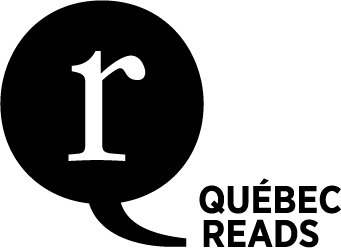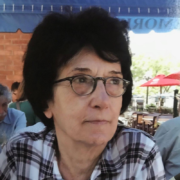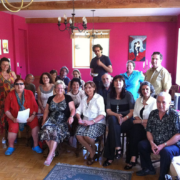Québec Reads – Interview with Felicia Mihali
This week Québec Reads spoke with the author of A Second Chance, Felicia Mihali. Her novel tells the story of a Romanian couple in the impressively multicultural city of Laval. It’s spring 2012 and Adam is recovering from a stroke. His right arm has been left paralyzed and his memories are almost completely gone. Daily life with his (unnamed) wife is both deathly dull (trips to Costco and the mall) and full of fear (he’s too afraid to answer the phone, scared that people will speak to him in the language he has now forgotten).
Our first-person narrator is a difficult woman to get along with; spending too much time in her company can be draining. She’s the type of woman who says darned instead of damned, and has grown to like suburbia. Finding a job near her home is, in her eyes, a “heavenly gift.” But she disapproves of her daughter going on a Caribbean cruise and gives up smoking because buying cigarettes is too much of a nuisance. Damningly, not even her daughter getting engaged manages to lift the gloom. Hell is other people, she seems to be telling us; Hell is a Sunday afternoon at Costco.
Reading her dreary, meticulous descriptions is occasionally tiresome, although they are not entirely without irony and some degree of self-deprecation. In all, it’s a subtle journey, albeit one that is well worth making, particularly for the understated but powerful writing style. Our feelings for Adam and his wife have to be earned as the book develops, but by the end (thanks in no small part to the realism of Mihali’s world) we find ourselves caring for them both as real people—and are genuinely caught off guard by a twist in the tale that changes everything.
Felicia Mihali, what was it like for you as an author spending so much time in your character’s company? Just how ambivalent did you want us to feel about her?
For people who know me, there is no secret that the no-name woman in the story is me. I am someone deeply in love with my daily routine, with cooking, washing, and cleaning. After hours spent in front of the computer or reading on the sofa, nothing gets me more relaxed than tidying up. I have never been to a gym and never intend to go. Do you want to keep yourself in shape? Then clean your house and cook for your family, like in the good old days.
People might judge this woman as a petty or trivial being, always focusing on small things. But what else is our life made of if not small things?
When you know how to deal with small things you know how to deal with the bigger ones. That is how this woman can go on with her life after her husband’s stroke left her in charge of a 50-year-old man who is no wiser than an 8-year-old boy. While everybody around pities her, she decides to take the best part of this nightmare and look for good or even beauty everywhere, and mostly where there is regularly none. She chooses to be generous and careful. Her heroism lies in making a normal and worthy life for her crippled husband. The narrator says of her relationship with her husband: “The real solidarity has always been between the two of us. Adam and I felt good together. It was as though the presence of other people disturbed our subtle chemistry.”
I think this “subtle chemistry” is as true for the novel as it is for the couple. As a novel, it’s a slow-burner. It’s all written in neat, measured, balanced sentences, but beneath the precision and the cold realism, there is certainly a flame. Aside from The Darling of Kandahar—a top Quebec pick for Canada Reads—you wrote your earlier novels in French. Do you think you could have built this tension just as effectively in French or do you think the sparseness of the writing in English helps make the novel what it is? There is something pleasantly evocative about lines like this, for instance:
“The mountains of snow on the sidewalks are melting; the streets are being washed by rain.”
This book would have been something completely different in French. It would have been a tragic, Shakespearean novel about faith, misfortune, hardship. When you know a language too well you cannot avoid the pitfall of giving too many details. My first experience with writing in English was the chance to be simple, colloquial, and funny. My previous books written in Romanian or French are really missing mockery which, as a reader, I appreciate a lot in a book. As a writer, I think I have always been a little too gloomy, mournful, melancholic. I do not say that English is funnier than the other two languages, or any others for that matter, but it is to me. Wittiness is also a trick to disguise a loose grammar. That’s what any beginner does: when you are not sure about what you’re saying or how to say it in a new language, you laugh a lot hoping that the native-speakers will believe you’re making a joke. My English is a language made out of lines I pick up here and there, in the movies, talk shows, or TV-news bulletins. It is an oral dialect more than an erudite one, even if I read a lot in English.
My sparseness, as you said, leads the plot; it makes it. In French, I feel as though I’m travelling in a cart pulled by a pair of oxen. I can look around, draw from a cigarette while chatting with passers-by. In English, au contraire, as I drive a fast car without knowing exactly how the brakes work I have to shout at people to get out of my way. In French, I can be very detailed and a little bit of a snob because my vocabulary has more than 3,000 words. In English I remain laconic. In French I am larmoyante; in English sharp like a razor. Some readers could believe I remain on the surface of things but I like to believe that most of them would be able to see deeper, as nothing should be taken at the first degree.
Going to Costco, the example you cite, is not only about shopping, it is more of a mockery about extended consumerism and the way any newcomer associates it with the American dream of wealth and prosperity. When immigrants can afford to fill their cart with those huge boxes, they feel like they have a hold on this country. For most of them, unfortunately, buying more than they need or can afford at Costco is the only hold they ever have on Canada.
A little later, we return to the theme of the couple again:
Certainly tolerance and indifference seem to be key here, both in the life of the couple and in our experience as readers. At times I found myself ambivalent about what was going on, at others I had tears in my eyes. Are these quiet, understated emotions of tolerance and indifference something more powerful in your eyes as a writer? Are they something you set out to explore in this novel? Perhaps we could consider the narrator appearing indifferent to others as some sort of achievement, a sign of strength, when we consider the other emotional responses she could have had.
Well, tolerance comes with old age, and this is true for anybody, not only for writers. At twenty you are sure you can change the world, in your late forties you are happy if the world doesn’t hurt you too much. Nolens volens, you become tolerant as your teeth get blunter, so you cannot bite as before. Yet indifference seems to me a very bad emotion to experience for any individual and the worst for a writer. Maybe the woman in the story could seem indifferent towards colleagues or friends, as she never laments, she never shows how desperate she is, never talks for example about how much she is missing her husband the way he was: funny, sexy, manly. I intentionally made her look a little cold, but her silence to me means acceptance and dignity, not indifference. And then, toward the end of the novel, everything changes. The tone doesn’t change, I think, but revelations shift our sympathies. What we learn doesn’t quite lead us to reconsider everything, but… The end of the story should reveal she is generous and forgiving. Why? What if one day something nice might again happen to her, to their couple? Illness is not the end. It could be the beginning of something else. Sometimes, taking care of a loved-one gives people the chance to test their inner selves.
I’d be interested to hear if you would still or have ever described yourself as a Quebec writer. And if you think there are major differences between fiction being published in Quebec at the moment compared to elsewhere.
First of all, I would like to know if Quebec considers me as a Quebec writer. I wonder if they do not consider migrant literature somehow a less valuable literature. Yet, as Mavis Gallant put it, I do what I have to do without questioning myself about my place in any official literature. It would be difficult anyway, mostly after switching to English. I now find myself in the unusual position of belonging nowhere. The French-Canadian mainstream blames me for letting down la Francophonie; English Canada considers me too French. Not to mention the attitude back in my country where no publisher would translate my books. As you can see, I am in the very comfortable position of being quite alone. This gives me the freedom to be myself and do things as I please. My big chances in this country were my publishers, people like André Vanasse and Linda Leith. As long as I can publish my books, it doesn’t matter what people consider me. The books are there, and that is what really matters. As for differences between literature here or elsewhere, there are only good or bad books. And Quebec has now so many good writers, in both languages. This evidence helps you forget that everything started nearly forty or fifty years ago.
What are some of your favourite books from Quebec?
There are so many writers, so many books that influenced me that I am afraid to start listing them. I am sure I will leave out many of them, but let’s try. I am fond of those unfinished books like Bouvard et Pécuchet (Flaubert) Dead Souls (Gogol), The Man Without Qualities (Robert Musil). They are the closest to what I consider to be perfect books. Luckily for us, the authors died before completing them, otherwise many of us should be ashamed of calling ourselves writers. We can still hope to do something worthwhile one day. What I like is when a book deals with more than a simple, soap- opera-like story, books made up of layers of magic, history, wisdom, mythology. In this field I would name everything written by Ismail Kadare, Ohran Pamuk, Garcia Marquez, Mo Yan, Yasunari Kawabata, Yukio Mishima, Dino Buzzati (The Tartar Steppe) Italo Calvino (mostly for his astonishing If on a Winter’s Night a Traveler) Milorad Pavic (for his wonderful Dictionary of the Khazars) Vladimir Nabokov (for his early short stories, written in Berlin) Borges, Danilo Kis, Herman Hesse, Ilf and Petrov (for their most comical books ever, The Little Golden Calf and The Twelve Chairs). I like Chekov, Maupassant, and Alice Munro for short stories. I like Cesare Pavese and Nina Berberova for their short novels. I adore Oriana Fallaci for the way she knew to embed fiction with journalism. I told you the list is long, I could go on and on. From time to time, I go back to these authors and they become better and better with every new reading.
As for Quebec literature, I am really amazed at the progress made over not more than half a century.
To name only a few that come to my mind, I could start with the classics like Anne Hébert, Réjean Ducharme, Marie-Claire Blais, Gabrielle Roy, Hugh MacLennan, Mavis Gallant, Mordecai Richler up to nowadays: Lise Tremblay, Gaétan Soucy, Andrée Laberge, Jocelyne Saucier, Dany Laferrière, Nelly Arcand, Michael Delisle, Max Férandon, Marie-Renée Lavoie1, David Clerson, Nicolas Dickner, Dominique Fortier2, Rawi Hage, Dimitri Nasrallah, Alain Farah and many, many others. This summer, I discovered Gordon Sheppard’s book HA!, which puzzled me. I mean, I liked it so much that I am planning to write something called OH!, a story as twisted as the one he tells about Hubert Aquin. I should thank Dimitri Nasrallah for mentioning Sheppard in an interview3; that’s how I discovered him. As a writer I was happy to be so disturbed by a book. To me it was a sign that I am still in business.
Felicia Mihali, fiction, Linda Leith Publishing, published, written in English
Quebec Reads
November 9, 2014
Peter McCambridge
Québec Reads: Interview with Felicia Mihali










